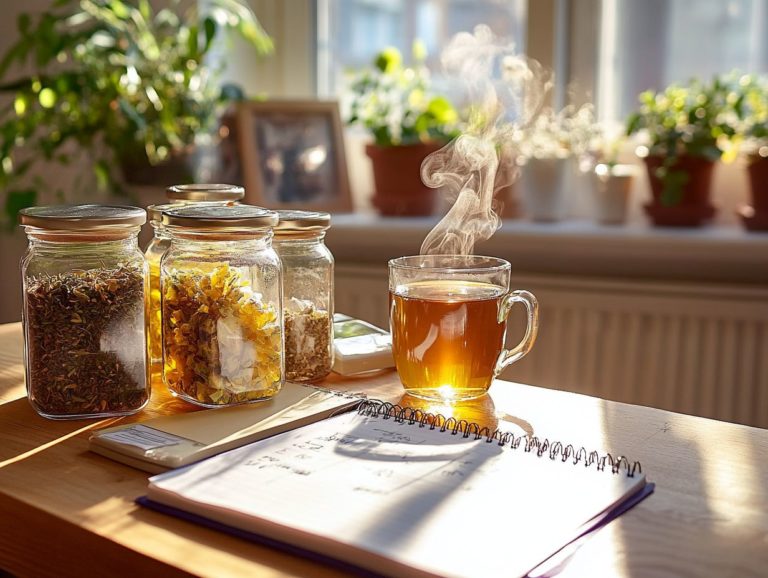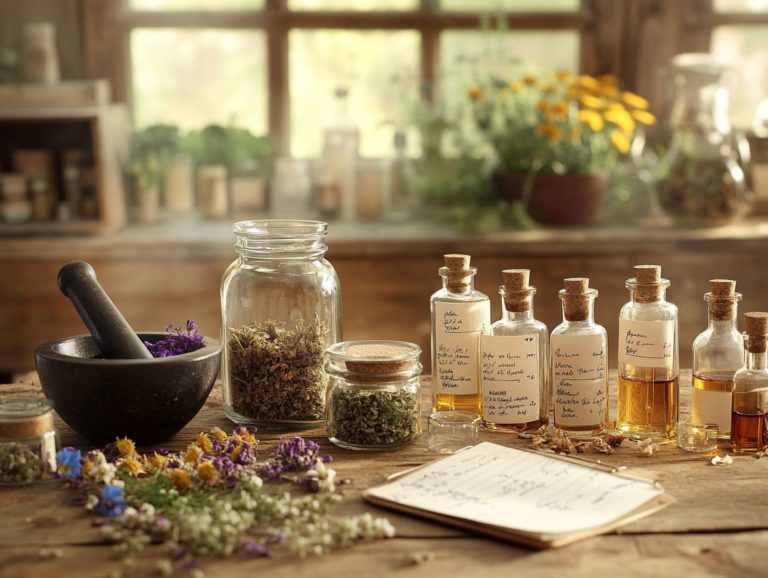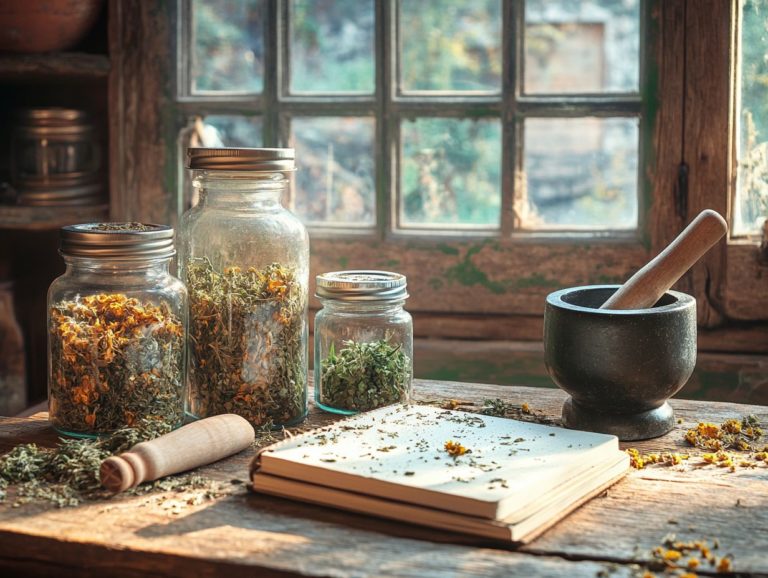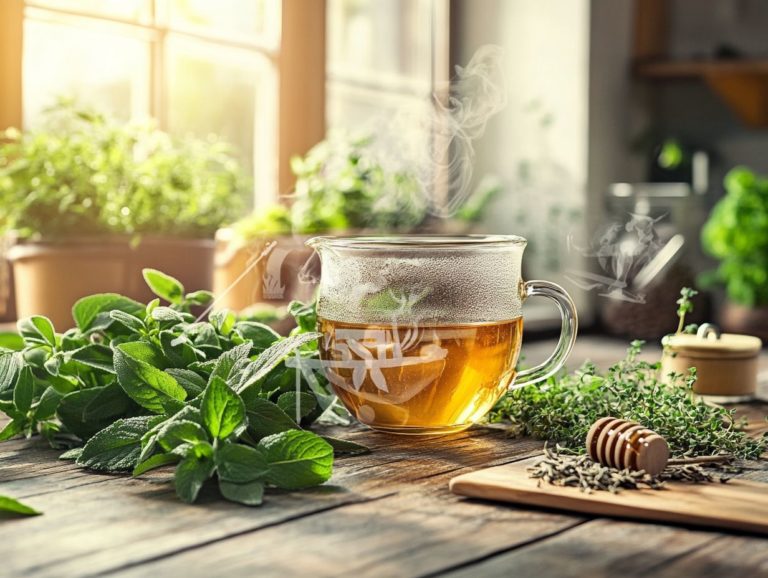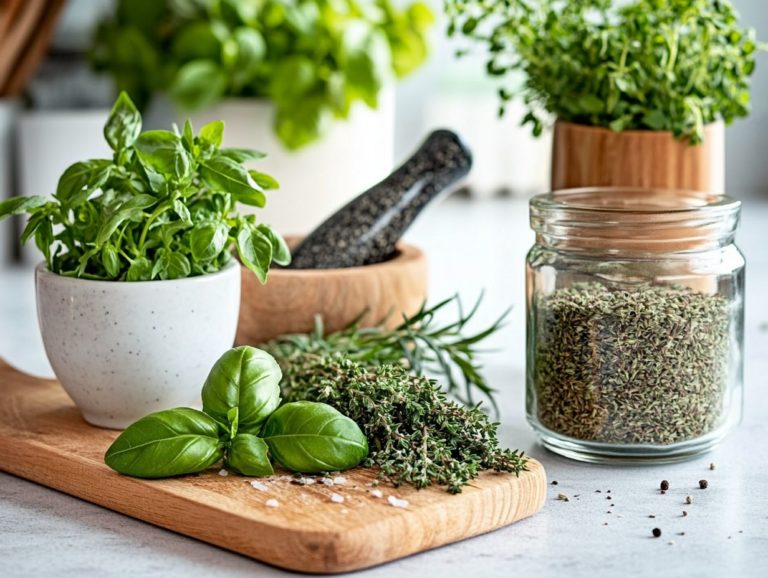What Are the Risks of Self-Medicating with Herbs?
As the allure of natural remedies captivates many, you may find yourself turning to herbs for self-medication. This practice can certainly offer a range of benefits, but it’s essential to recognize the potential risks that come along with it.
This article delves into the definition and prevalence of self-medicating with herbs, uncovering possible adverse reactions, quality control concerns, and the most commonly used herbs. You’ll also find guidelines for safe practices and alternative options if you’re considering herbal treatment.
Whether you re a seasoned herbalist or simply intrigued by the trend, grasping the full picture is crucial for making informed choices.
Contents
- Key Takeaways:
- The Practice of Self-Medicating with Herbs
- Potential Risks of Self-Medication with Herbs
- Commonly Used Herbs for Using Herbs on Your Own
- How to Safely Use Herbs on Your Own
- Alternative Options for Herbal Treatment
- Frequently Asked Questions
- What risks come with self-medicating using herbs?
- Can self-medicating with herbs be dangerous?
- What are some common side effects of self-medicating with herbs?
- Are there specific herbs that are riskier to self-medicate with?
- How can I ensure the safety of self-medicating with herbs?
- Are there circumstances where self-medicating with herbs is not recommended?
Key Takeaways:
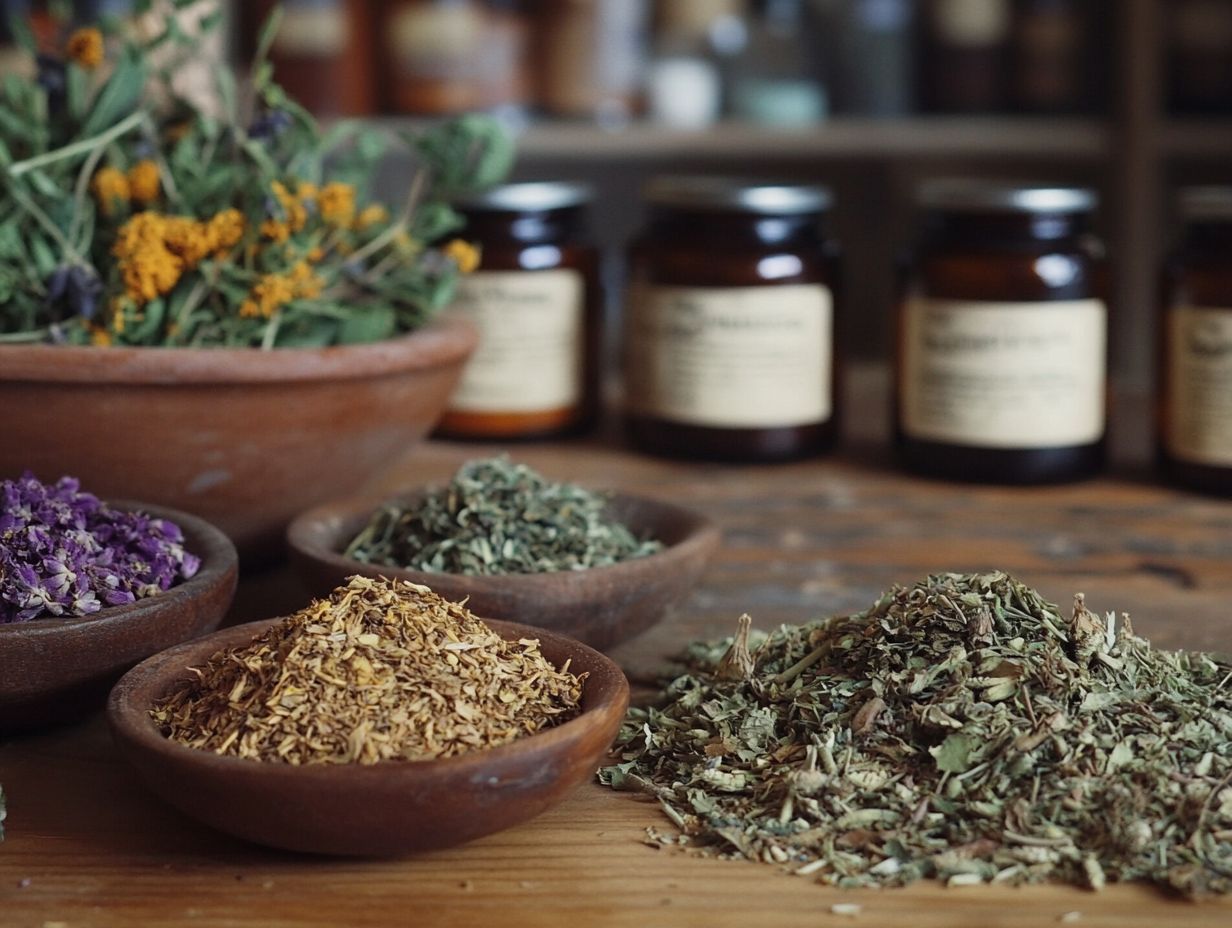
- Self-medicating with herbs can be dangerous due to potential adverse reactions and interactions with other medications.
- Quality control and contamination are common risks associated with self-medicating with herbs.
- To safely self-medicate with herbs, it is important to follow guidelines and precautions and consider treatment options, such as consulting with healthcare professionals or trying other natural remedies.
The Practice of Self-Medicating with Herbs
The practice of self-medicating with herbs has become increasingly popular as you seek alternative treatments for various health conditions, especially in the realm of mental health. This approach often leads you to use herbal remedies to manage symptoms of anxiety disorders, depression, and other psychological issues. Understanding when professional medical advice may be necessary is vital.
With growing awareness of mental health challenges, many individuals are seeking guidance from healthcare professionals for safe self-medication practices. This underscores the importance of understanding what to know before using herbal remedies and how these herbs can impact your emotional well-being and overall health amidst the risks of substance misuse.
Definition and Prevalence
Self-medication refers to the practice of using various substances, including herbal remedies, to address health issues without professional oversight. This behavior is widespread across different demographics globally.
This approach includes a diverse array of substances, from over-the-counter medications like pain relievers and antihistamines to prescription drugs acquired without a valid prescription. You might find yourself turning to self-medication for common ailments like headaches, minor injuries, anxiety, and cold symptoms, often seeing it as a convenient solution. However, it’s important to be aware of common myths about herbal remedies before relying on them.
According to the National Survey on Drug Use and Health, approximately 15% of adults engage in this practice. Notably, differences emerge across age groups, genders, and geographical locations, revealing a growing trend particularly among younger individuals and in urban settings.
Potential Risks of Self-Medication with Herbs
While you might consider self-medicating with herbs for their perceived benefits, it s crucial to recognize the potential risks involved in unmonitored use, especially concerning health risks and possible interactions with other medications.
Adverse Reactions and Interactions
Adverse reactions to herbal remedies can vary widely and may lead to serious health issues, especially when they interact with prescription or OTC medications. Numerous documented cases illustrate the potential dangers of such interactions. For instance, St. John’s Wort, often used to manage depression, can interfere with the effectiveness of certain antidepressants and birth control pills, resulting in unintended consequences.
Similarly, ginseng can impact blood sugar levels, posing risks for those on diabetes medications. These examples highlight the crucial importance of consulting healthcare professionals before adding herbal remedies to your treatment plans. Additionally, it’s vital to be aware of the risks of improper herbal dosage and to monitor for any potential side effects and drug interactions as well. Prioritizing your health means being informed and cautious.
Don’t take chances with your health! Always consult with a healthcare professional before trying new herbal remedies, and be sure to understand herbal safety: what you need to know.
Quality Control and Contamination
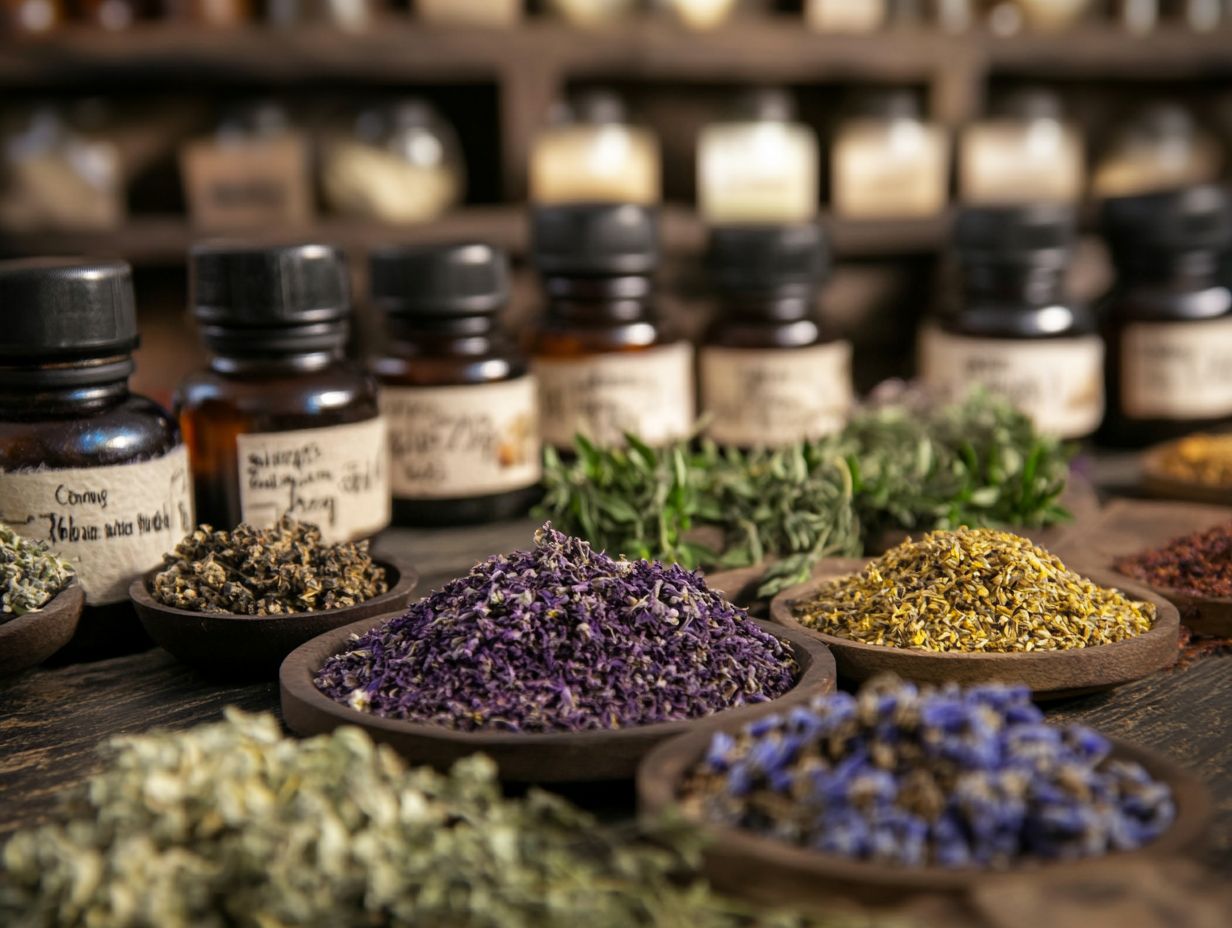
Quality control in the production of herbal supplements often falls short, leading to contamination and adulteration that can pose significant health risks for you, especially if you engage in using herbs on your own or substance misuse.
This oversight might result in harmful substances like heavy metals, pesticides, or even pharmaceutical contaminants finding their way into products that promise health benefits. Before using any remedies, it’s important to consider are there side effects of herbal remedies? Relying on subpar products can unknowingly jeopardize your health.
To navigate this intricate landscape, it’s crucial to seek out certifications such as Good Manufacturing Practices (GMP), which ensure adherence to regulations set by recognized authorities. These certifications provide assurance that the products meet stringent quality standards, fostering safer consumption and boosting your confidence in herbal treatments. Additionally, it’s important to be aware of common mistakes to avoid with herbal remedies for optimal safety and efficacy.
Commonly Used Herbs for Using Herbs on Your Own
Commonly used herbs for using herbs on your own encompass a diverse array of plants that can enhance emotional well-being and mitigate symptoms linked to various health conditions, such as anxiety and depression.
Benefits and Risks of Popular Herbs
Before choosing popular herbs, take a moment to weigh their benefits and risks! Herbs like St. John’s Wort, Chamomile, and Valerian Root have a rich history, having been utilized for centuries across various cultures to support emotional well-being and mental health.
Take St. John’s Wort, for example; it’s known for its ability to lift your mood, making it a top pick for those facing mild to moderate depression. Chamomile is renowned for its calming effects, helping to melt away stress and encourage restful sleep. Valerian Root, too, is well-regarded for its sedative qualities, frequently recommended for individuals struggling with anxiety and insomnia. To ensure the best outcomes, it’s important to learn how to use herbal remedies responsibly.
However, while these herbs can provide valuable support, they also come with potential side effects. It’s important to be aware of interactions with other medications or even allergic reactions. For safe preparation, consider following safety tips for creating herbal remedies in your self-care approach.
How to Safely Use Herbs on Your Own
To safely use herbs on your own, adhere to specific guidelines and best practices that underscore the significance of consulting healthcare professionals for appropriate treatment recommendations. This approach enhances your well-being and ensures your choices align with expert advice.
Guidelines and Precautions
Setting clear guidelines for using herbs can help reduce health risks associated with herbal remedies while enhancing your overall understanding of patient education related to emotional well-being.
Before you embark on the journey of using herbs on your own, it’s essential to conduct thorough research on each remedy, familiarizing yourself with their potential benefits and side effects. Additionally, be aware of the risks of self-medicating with herbal dosages. Consulting with healthcare professionals is equally crucial; they can offer tailored advice based on your personal health history.
Being aware of possible interactions with prescription medications and other supplements is vital for preventing adverse effects. Having a comprehensive understanding of dosages and quality standards can contribute to safer practices.
Ultimately, the goal is to empower you with knowledge, enabling informed decisions that prioritize safety and efficacy in your health management.
Alternative Options for Herbal Treatment
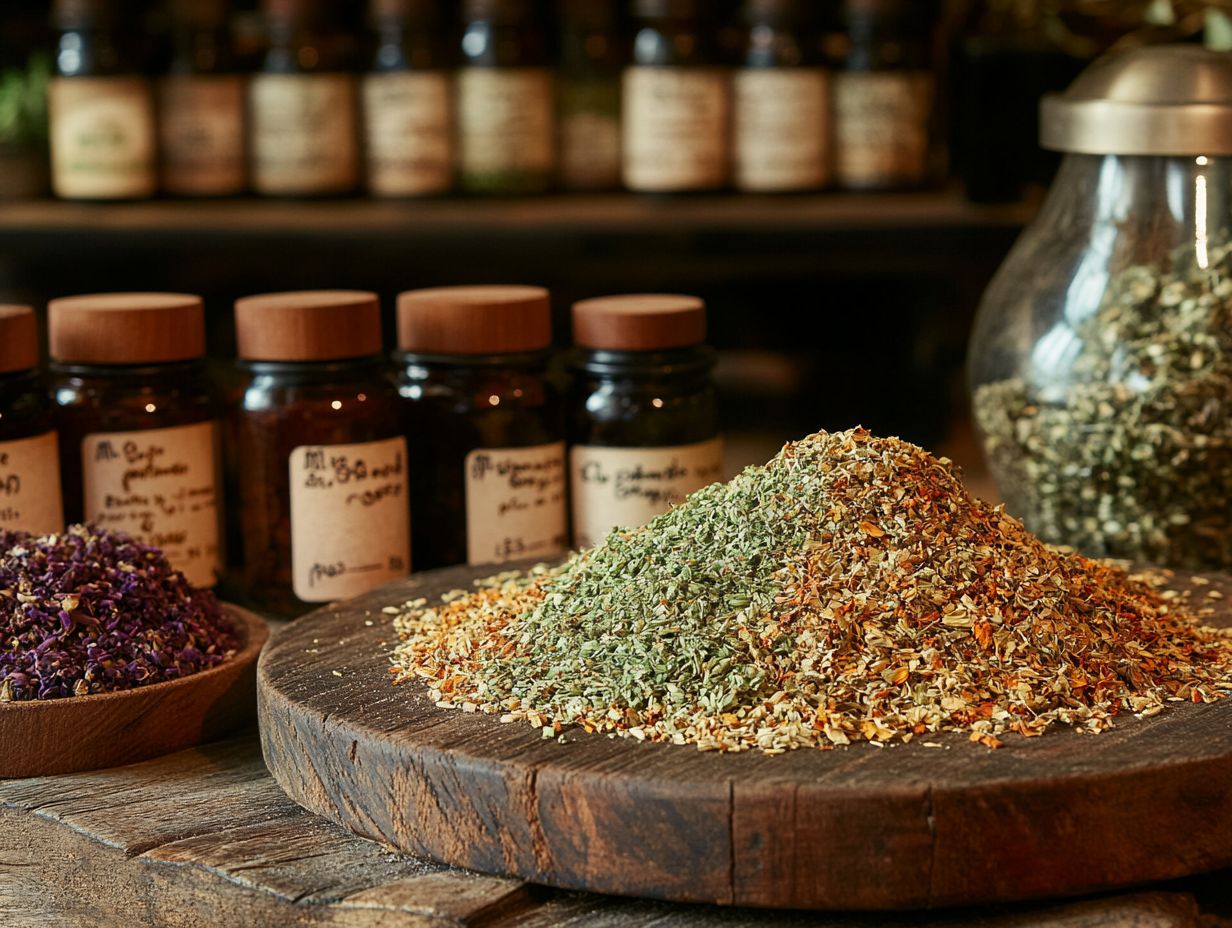
Exploring alternative options for herbal treatment is crucial for those like you who are seeking comprehensive methods to manage psychological conditions, including co-occurring disorders, and enhance overall health.
Embracing these natural remedies can open doors to a more holistic approach to well-being.
Consulting with a Professional
It’s important to consult healthcare professionals before adding herbal treatments to your mental health plan. These experts help you understand the nuances of herbal remedies, particularly regarding potential interactions with prescribed medications or the risk of worsening existing health issues.
By offering personalized advice, healthcare professionals guide you through the many options available, ensuring your choices are safe and beneficial. This guidance promotes a holistic approach to mental health and empowers you to make informed decisions, ultimately leading to improved outcomes in your overall well-being and coping mechanisms.
Other Natural Remedies
Discover how natural remedies can enhance your emotional well-being! Along with herbal treatments, various natural remedies can significantly improve your emotional health and provide powerful coping mechanisms for a range of health conditions, including anxiety disorders and depression.
These remedies include aromatherapy, essential oils, and mindfulness practices like meditation and yoga. Each option offers unique benefits, contributing to stress reduction and greater mood stability. For instance, essential oils like lavender and chamomile are celebrated for their calming effects, effectively alleviating feelings of anxiety. However, it’s important to ensure safety when using herbs; you can learn more by checking how do I know if an herb is safe?
However, it’s crucial to remain aware of potential risks, such as allergic reactions or interactions with other medications.
By integrating these approaches into your health plan that considers your overall well-being, you can elevate your overall wellness, addressing not only symptoms but also the underlying causes of your distress.
Frequently Asked Questions
What risks come with self-medicating using herbs?
The risks of self-medicating with herbs include potential side effects, drug interactions, and improper dosing.
Can self-medicating with herbs be dangerous?
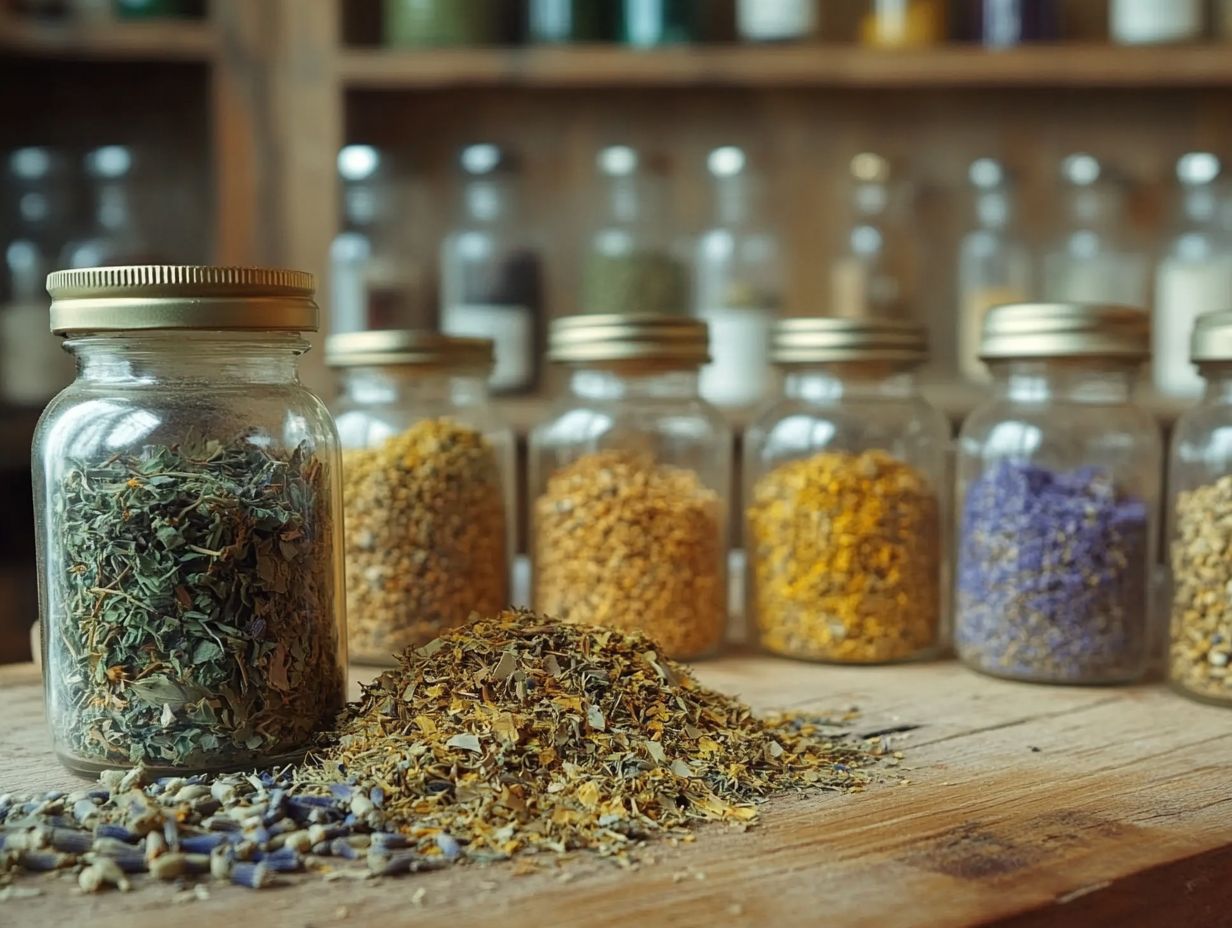
Yes, self-medicating with herbs can be dangerous if not done properly. Herbs can have strong effects on the body and can interact with other medications.
What are some common side effects of self-medicating with herbs?
Common side effects include nausea, diarrhea, headaches, allergic reactions, and liver damage.
Are there specific herbs that are riskier to self-medicate with?
Yes, some herbs, such as St. John’s Wort, kava, and valerian, can have more serious side effects and interactions with certain medications.
How can I ensure the safety of self-medicating with herbs?
It is important to consult with a healthcare professional before self-medicating with herbs. They can provide guidance on proper dosing, potential interactions, and monitor for any side effects.
Are there circumstances where self-medicating with herbs is not recommended?
Yes, if you have a chronic health condition, such as Post-Traumatic Stress Disorder (PTSD) or Attention Deficit Hyperactivity Disorder (ADHD), or are taking prescription medications, including opiate drugs like codeine or morphine, it is not recommended to self-medicate with herbs without consulting a healthcare professional first.

